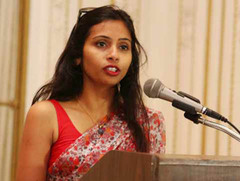
NEW DELHI: India is making every attempt to ensure that the United States drops all charges against IFS officer Devyani Khobragade, whose arrest in New York two years ago had led to a diplomatic standoff between the two nations. "India and the U.S. have initiated an official dialogue to comprehensively address all aspects related to the case against Khobragade and all issues arising from differing perspectives...

on diplomatic privileges and immunities. "Our government is making all attempts so that all charges levelled against her are dropped," External Affairs Minister Sushma Swaraj told the Lok Sabha during the Question Hour.
The former Indian diplomat, then serving in the US, was arrested in New York on December 12, 2013 on charges of "visa fraud" and released on bail the same day. This had led to a major diplomatic standoff between India and the US.
Though she was spared legal action after the US granted her full diplomatic immunity following her transfer by India to the Indian Permanent Mission to the United Nations, an arrest warrant was issued against her and she was subsequently transferred back to India. Swaraj also cited other instances of mistreatment of Indian diplomats in the last few years which occured in Slovenia, Romania, Albania and Pakistan, besides such treatment meted out to eminent Indian citizens, including former President A P J Abdul Kalam who was subjected to frisking at New York airport against protocols. Such actions have not been repeated in these countries except Pakistan after the matter was taken up with the respective governments, Swaraj said.
In Pakistan, members of the High Commission have been subjected to "intrusive surveillance, including "tailing by the intelligence and security personnel of the Pakistan government". India has taken up the matter strongly with Pakistan at various levels, she said.
Indian personnel serving in foreign missions are "regularly sensitised to be more vigilant about their personal security and local security norms and practices" and relevant cultural issues, Swaraj added.
The former Indian diplomat, then serving in the US, was arrested in New York on December 12, 2013 on charges of "visa fraud" and released on bail the same day. This had led to a major diplomatic standoff between India and the US.
Though she was spared legal action after the US granted her full diplomatic immunity following her transfer by India to the Indian Permanent Mission to the United Nations, an arrest warrant was issued against her and she was subsequently transferred back to India. Swaraj also cited other instances of mistreatment of Indian diplomats in the last few years which occured in Slovenia, Romania, Albania and Pakistan, besides such treatment meted out to eminent Indian citizens, including former President A P J Abdul Kalam who was subjected to frisking at New York airport against protocols. Such actions have not been repeated in these countries except Pakistan after the matter was taken up with the respective governments, Swaraj said.
In Pakistan, members of the High Commission have been subjected to "intrusive surveillance, including "tailing by the intelligence and security personnel of the Pakistan government". India has taken up the matter strongly with Pakistan at various levels, she said.
Indian personnel serving in foreign missions are "regularly sensitised to be more vigilant about their personal security and local security norms and practices" and relevant cultural issues, Swaraj added.

 RSS Feed
RSS Feed
